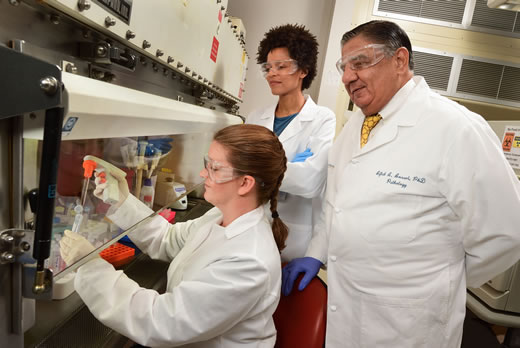As a new research year begins, Emory scientists are likely to advance their work in fields including HIV/AIDS and Zika viruses, fecal transplants for antibiotic-resistant infections and transplant recipients, and deep-brain stimulation to treat disease and enhance brain function. Read about more fundamental and clinical research breakthroughs at the Emory Lab Land blog.
HIV/AIDS
The example of the "Berlin patient," the only person ever cured of HIV infection, has energized HIV/AIDS researchers around the world. They are exploring a variety of tactics to attack the HIV reservoir in infected people, ranging from gene editing to "kick and kill." A host of researchers at Emory/Yerkes National Primate Research Center are among those pushing this forward.
This past year, an Emory/NIAID team led by Aftab Ansari, PhD, professor of pathology and laboratory medicine, showed that a gentle, antibody-based approach could suppress SIV infection in macaques for extended periods, which surprised many in the field. The human test of this approach is now underway at the National Institutes of Health.
On the preventive vaccine side, a large scale efficacy study recently began in South Africa, the first in seven years. Atlanta-vased GeoVax's Emory-rooted technology continues to advance in clinical studies. Further back in the pipeline, Yerkes researchers are testing innovative approaches, such as a milk-bacteria-based mucosal vaccine from the lab of Rama Amara, PhD, and the potent nanoparticle adjuvants developed by Bali Pulendran, PhD, and his group.
Zika
Despite the World Health Organization's declaration in November that the public health emergency is over, Zika infection is still driving brain-related birth defects in several countries. Expect to hear more about Zika epidemiology and vaccine research, including from Emory investigators, this year.
In contrast with HIV, which seems to escape from almost anything humans, or their immune systems throw at it, Zika is doable, scientists think. At an Emory Emory talk in September, Harvard's Dan Barouch made the case that Zika is a slam dunk, immunologically. Two big questions remain: does dengue get in the way? And can vaccine makers test quickly and distribute widely?
Fecal transplant for antibiotic-resistant infections
Emory physicians have been leaders in developing fecal microbiota transplant (FMT) as a remedy for recurrent Clostridium dificile infection. This form of diarrhea, which can be life-threatening, sometimes arises as a result of antibiotics that wipe out the helpful bacteria that live in the intestines, paving the way for C diff.
Now the Emory team (Colleen Kraft, MD; Tanvi Dhere, MD; Aneesh Mehta, MD; and Rachel Friedman-Moraco, MD) is testing whether FMT could prevent other antibiotic-resistant infections besides C diff. This approach will be examined in a group of patients that tends to have a lot of antibiotic exposure: kidney transplant recipients. The team's first publication on this topic from 2014 is here.
Electrical stimulation of the brain to enhance memory
At Emory, physicians have led efforts to develop deep brain stimulation to treat Parkinson's, epilepsy, and treatment-resistant depression. Now experiments are underway to test whether similar techniques can enhance memory.
To be sure, there already have been some reports on transcranial (that is, non-invasive) electrical stimulation to enhance memory, enough that some neurologists have published a warning to the "do it yourself" community.
Additional 2017 topics to watch
Watch for additional key topics that could capture attention in 2017, including testing of immunotherapy in additional types of cancer such as breast cancer, the prospect of customizing a cancer patient's diet to tumor-specific genetics, and cardiology outcomes for PCSK9 inhibitors.

